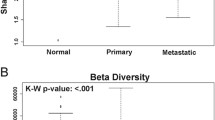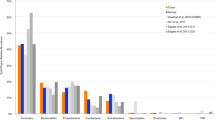Abstract
Purpose
Human microbiome has been considered as the second genome of our body. The intratissue/intratumor microbiome analysis is a relatively new field and deserves more attention. In this study, we conducted a comprehensive analysis of microbiome signatures of head and neck squamous cell carcinoma (HNSC).
Methods
The intratumor microbiome profiling and clinicopathological information about a total of 177 HNSC samples, including 155 tumors and 22 adjacent normal tissues, were obtained from The Cancer Microbiome Atlas (TCMA) and The Cancer Genome Atlas (TCGA) databases. We identified the microbes that differed between tumors and normal tissues, and assessed their utility values as diagnostic biomarkers. The microbiome signatures under different conditions of clinicopathological parameters were also analyzed.
Results
The intratissue microbiome profiles differed between tumor and normal samples of HNSC. The composition of four, six, and six microbes changed in tumors compared to normal tissues at the phylum, order, and genus levels, respectively (P < 0.05). Eight of the differential microbes performed well in distinguishing tumors from normal tissues (AUC > 0.7, P ≤ 0.001). The microbiome signature was found to be associated with tumor clinicopathological characteristics such as host-gender, host-age, tumor stage, and neoplasm histologic grade.
Conclusion
Overall, our results revealed an intratissue microbiome signature of HNSC. We concluded that the intratumor microbiome signature may also reflect human biology in both healthy and disease status, and provide novel perspective for microbiota research about their roles in tumors.



Similar content being viewed by others
References
Albouery M, Buteau B, Gregoire S et al (2019) Age-related changes in the gut microbiota modify brain lipid composition. Front Cell Infect Microbiol 9:444. https://doi.org/10.3389/fcimb.2019.00444
Brennan CA, Garrett WS (2019) Fusobacterium nucleatum - symbiont, opportunist and oncobacterium. Nat Rev Microbiol 17:156–166. https://doi.org/10.1038/s41579-018-0129-6
Bullman S, Pedamallu CS, Sicinska E et al (2017) Analysis of Fusobacterium persistence and antibiotic response in colorectal cancer. Science (80-) 358:1443–1448. https://doi.org/10.1126/science.aal5240
Collins FS, Varmus H (2015) A new initiative on precision medicine. N Engl J Med 372:793–795. https://doi.org/10.1056/NEJMp1500523
Dohlman AB, Arguijo Mendoza D, Ding S et al (2021) The cancer microbiome atlas: a pan-cancer comparative analysis to distinguish tissue-resident microbiota from contaminants. Cell Host Microbe 29:281-298 e5. https://doi.org/10.1016/j.chom.2020.12.001
Doniger T, Adams JM, Marais E et al (2020) The “fertile island effect” of Welwitschia plants on soil microbiota is influenced by plant gender. FEMS Microbiol Ecol. https://doi.org/10.1093/femsec/fiaa186
Gaiser RA, Halimi A, Alkharaan H et al (2019) Enrichment of oral microbiota in early cystic precursors to invasive pancreatic cancer. Gut 68:2186–2194. https://doi.org/10.1136/gutjnl-2018-317458
Ganly I, Yang L, Giese RA et al (2019) Periodontal pathogens are a risk factor of oral cavity squamous cell carcinoma, independent of tobacco and alcohol and human papillomavirus. Int J Cancer 145:775–784. https://doi.org/10.1002/ijc.32152
Grice EA, Segre JA (2012) The human microbiome: our second genome. Annu Rev Genom Hum Genet 13:151–170. https://doi.org/10.1146/annurev-genom-090711-163814
Haider AA, Marino MJ, Yao WC et al (2019) The potential of high-throughput DNA sequencing of the paranasal sinus microbiome in diagnosing odontogenic sinusitis. Otolaryngol Head Neck Surg 161:1043–1047. https://doi.org/10.1177/0194599819866692
Hayes RB, Ahn J, Fan X et al (2018) Association of oral microbiome with risk for incident head and neck squamous cell cancer. JAMA Oncol 4:358–365. https://doi.org/10.1001/jamaoncol.2017.4777
Helmink BA, Khan MAW, Hermann A et al (2019) The microbiome, cancer, and cancer therapy. Nat Med 25:377–388. https://doi.org/10.1038/s41591-019-0377-7
Hutter C, Zenklusen JC (2018) The Cancer Genome Atlas: creating lasting value beyond its data. Cell 173:283–285. https://doi.org/10.1016/j.cell.2018.03.042
Irfan M, Delgado RZR, Frias-Lopez J (2020) The oral microbiome and cancer. Front Immunol 11:591088. https://doi.org/10.3389/fimmu.2020.591088
Kim S, Jazwinski SM (2018) The gut microbiota and healthy aging: a mini-review. Gerontology 64:513–520. https://doi.org/10.1159/000490615
Koliada A, Moseiko V, Romanenko M et al (2021) Sex differences in the phylum-level human gut microbiota composition. BMC Microbiol 21:131. https://doi.org/10.1186/s12866-021-02198-y
Mahajan E, Cheng J (2021) A pilot investigation of the pediatric nasal microbiome. Otolaryngol Head Neck Surg. https://doi.org/10.1177/01945998211004161
Matson V, Chervin CS, Gajewski TF (2021) Cancer and the microbiome-influence of the commensal microbiota on cancer, immune responses, and immunotherapy. Gastroenterology 160:600–613. https://doi.org/10.1053/j.gastro.2020.11.041
Minty M, Loubieres P, Canceill T et al (2021) Gender-associated differences in oral microbiota and salivary biochemical parameters in response to feeding. J Physiol Biochem 77:155–166. https://doi.org/10.1007/s13105-020-00757-x
Nakatsu G, Li X, Zhou H et al (2015) Gut mucosal microbiome across stages of colorectal carcinogenesis. Nat Commun 6:8727. https://doi.org/10.1038/ncomms9727
Nejman D, Livyatan I, Fuks G et al (2020) The human tumor microbiome is composed of tumor type-specific intracellular bacteria. Science (80-) 368:973–980. https://doi.org/10.1126/science.aay9189
Odamaki T, Kato K, Sugahara H et al (2016) Age-related changes in gut microbiota composition from newborn to centenarian: a cross-sectional study. BMC Microbiol 16:90. https://doi.org/10.1186/s12866-016-0708-5
Parhi L, Alon-Maimon T, Sol A et al (2020) Breast cancer colonization by Fusobacterium nucleatum accelerates tumor growth and metastatic progression. Nat Commun 11:3259. https://doi.org/10.1038/s41467-020-16967-2
Picardo SL, Coburn B, Hansen AR (2019) The microbiome and cancer for clinicians. Crit Rev Oncol Hematol 141:1–12. https://doi.org/10.1016/j.critrevonc.2019.06.004
Rai AK, Panda M, Das AK et al (2021) Dysbiosis of salivary microbiome and cytokines influence oral squamous cell carcinoma through inflammation. Arch Microbiol 203:137–152. https://doi.org/10.1007/s00203-020-02011-w
Rodriguez RM, Hernandez BY, Menor M et al (2020) The landscape of bacterial presence in tumor and adjacent normal tissue across 9 major cancer types using TCGA exome sequencing. Comput Struct Biotechnol J 18:631–641. https://doi.org/10.1016/j.csbj.2020.03.003
Shin JM, Luo T, Kamarajan P et al (2017) Microbial communities associated with primary and metastatic head and neck squamous cell carcinoma—a high fusobacterial and low streptococcal signature. Sci Rep 7:9934. https://doi.org/10.1038/s41598-017-09786-x
Spychala MS, Venna VR, Jandzinski M et al (2018) Age-related changes in the gut microbiota influence systemic inflammation and stroke outcome. Ann Neurol 84:23–36. https://doi.org/10.1002/ana.25250
Su SC, Chang LC, Huang HD et al (2021) Oral microbial dysbiosis and its performance in predicting oral cancer. Carcinogenesis 42:127–135. https://doi.org/10.1093/carcin/bgaa062
Takagi T, Naito Y, Inoue R et al (2019) Differences in gut microbiota associated with age, sex, and stool consistency in healthy Japanese subjects. J Gastroenterol 54:53–63. https://doi.org/10.1007/s00535-018-1488-5
Valeri F, Endres K (2021) How biological sex of the host shapes its gut microbiota. Front Neuroendocrinol 61:100912. https://doi.org/10.1016/j.yfrne.2021.100912
Wang H, Funchain P, Bebek G et al (2017) Microbiomic differences in tumor and paired-normal tissue in head and neck squamous cell carcinomas. Genome Med 9:14. https://doi.org/10.1186/s13073-017-0405-5
Wang J, Li X, Wu X et al (2021) Uncovering the microbiota in renal cell carcinoma tissue using 16S rRNA gene sequencing. J Cancer Res Clin Oncol 147:481–491. https://doi.org/10.1007/s00432-020-03462-w
Wang J, Wang Y, Li Z, Gao X, Huang D (2021) Global analysis of microbiota signatures in four major types of gastrointestinal cancer. Front Oncol 11:685641
Wong LM, Shende N, Li WT et al (2020) Comparative analysis of age- and gender-associated microbiome in lung adenocarcinoma and lung squamous cell carcinoma. Cancers (Basel). https://doi.org/10.3390/cancers12061447
Yang CY, Yeh YM, Yu HY et al (2018) Oral microbiota community dynamics associated with oral squamous cell carcinoma staging. Front Microbiol 9:862. https://doi.org/10.3389/fmicb.2018.00862
Yang Y, Liu S, Wang Y et al (2020) Changes of saliva microbiota in the onset and after the treatment of diabetes in patients with periodontitis. Aging (Albany NY) 12:13090–13114. https://doi.org/10.18632/aging.103399
Zhang L, Liu Y, Zheng HJ, Zhang CP (2019) The oral microbiota may have influence on oral cancer. Front Cell Infect Microbiol 9:476. https://doi.org/10.3389/fcimb.2019.00476
Zhu B, Wang X, Li L (2010) Human gut microbiome: the second genome of human body. Protein Cell 1:718–725. https://doi.org/10.1007/s13238-010-0093-z
Funding
This work was supported by the Fundamental Research Funds for the Central Universities of Northwestern Polytechnical University (G2020KY0516), Shaanxi Provincial Key Research and Development Program (2021SF-030).
Author information
Authors and Affiliations
Contributions
YW, data collection and analysis, drafting the paper, agree to be accountable. YW, data analysis, revised the manuscript, agree to be accountable. JW, data analysis, drafting and critical review, final approval, agree to be accountable.
Corresponding author
Ethics declarations
Conflict of interest
The authors declare no conflicts of interest.
Ethical approval
This study was approved by the Institutional Review Board of Institute of Medical Research, Northwestern Polytechnical University.
Additional information
Publisher's Note
Springer Nature remains neutral with regard to jurisdictional claims in published maps and institutional affiliations.
Supplementary Information
Below is the link to the electronic supplementary material.
Rights and permissions
About this article
Cite this article
Wang, Y., Wang, Y. & Wang, J. A comprehensive analysis of intratumor microbiome in head and neck squamous cell carcinoma. Eur Arch Otorhinolaryngol 279, 4127–4136 (2022). https://doi.org/10.1007/s00405-022-07284-z
Received:
Accepted:
Published:
Issue Date:
DOI: https://doi.org/10.1007/s00405-022-07284-z




